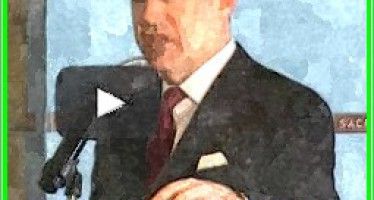Voter ID bill disenfranchised
Jan. 12, 2010
By KATY GRIMES
A bill designed to combat voter fraud was disenfranchised in the state Senate’s elections committee after a close vote and plenty of testimony in opposition.
The committee heard testimony of the bill proposed by Sen. Bob Huff, R-Diamond Bar, requiring government-issued identification to vote. Current law states that only first-time voters are required to show identification.
Huff appeared before the committee and explained that SB465 was necessary for “maintaining integrity at the ballot box – we must know our vote will count.” When Senator Huff first introduced the bill in March 2009, he explained that the purpose of the bill would help ensure that only those who have a constitutional right to vote are choosing our elected officials.
In testimony, Huff explained that voter fraud is a problem in California and has been highlighted many times in news investigations, citing the 1999 60 Minutes story that found people in California who used mail-in forms to register fictitious voters, and even their pets, and then obtained absentee ballots in those names. Huff said that fraud still occurs, necessitating the voter identification bill. Huff also shared the example of the illegal immigrant who assassinated a Mexican presidential candidate who, ironically was registered twice to vote in San Pedro, Calif.
Representatives from the American Civil Liberties Union, AARP, the League of Women Voters, Disability Rights California, Dolores Huerta Foundation, Asian Americans for Civil Rights and Equality, and California Immigrant Policy Center testified in opposition to the Voter ID bill, each presenting a common theme of “voter disenfranchisement” and “discrimination.”
Appearing in support of the bill, David Wolfe from the Howard Jarvis Taxpayers Association, opined, “I need identification to get a library card or use my credit card at Best Buy. Why not show ID?”
ACLU Representative Tiffany Mock said the ACLU was opposed to the bill because “it would disproportionately affect the elderly, working poor and racial minorities, who statistically are less likely to have this form of identification. … Having to show ID makes it more difficult to vote.” Ms. Mock did not explain how the elderly, racial minorities or working poor would be affected, or why they are less likely to carry identification.
Trudy Schafer from the League of Women Voters explained that the League’s opposition to SB 465 was the “burden to the elderly and disabled” if they had to get government-issued identification. Schafer said they believe that having to show identification to vote could be a “possible privacy issue.” Margaret Johnson with Disability Rights California said that she was in agreement with the previous speakers in opposition to SB 465 because having to produce identification to vote “would be a burden to the disabled as many disabled persons do not have the requisite ID.”
Nationally, the ACLU and the League of Women Voters have been opposed to voter identification laws. The League of Women Voters “opposes efforts to create new barriers that block citizen voter participation” as well as opposing ID and documentary proof-of-citizenship requirements.
The committee chairwoman, Sen. Loni Hancock, D-Oakland, spoke in opposition, stating that she would not be voting for the bill because “it will chill voter participation for people of color, immigrants, the young and old, and new voters.” Hancock used herself as an example stating, “an old picture could lead to problems with poll workers, and people do not have time to do that.”
Sen. Tony Strickland, R-Thousand Oaks, questioned several of those opposing the bill, and asked if their organizations oppose using ID to board a plane. The League of Women Voters’ Schafer said it was discriminatory to ask someone for ID. Ignacio Hernandez with the Dolores Huerta Foundation answered that he would need to look at voter intimidation laws in California and “requiring government-issued identification to vote is a civil liberties issue because the Hispanic population would be required to pay to have an ID” and that “could be considered a poll tax.”
Several of the opposition groups claimed that the bill is overly strict and exceeds the voter identification requirements contained in the federal Help America Vote Act (HAVA) or as required in current California law.
Sen. Mimi Walters, R-Laguna Niguel, disputed the claim of disenfranchisement: “It is not a burden on a person” to produce identification “in order to protect the electoral process.” Walters added, “Even my children must carry student ID” and said that she hoped the committee would pass the bill.
The bill failed, 3-2.
In 2008, with 29 states already requiring some form of identification to vote, the U. S. Supreme Court voted 6-3 to uphold voter identification laws. In California, there are currently 30 different forms of identification that can be used under HAVA, including a government issued check or a utility bill that includes the person’s name and address.
Related Articles
Brown, Newsom ace Napolitano
This now is Gov. Jerry Brown’s ninth decade in California politics. He was born in 1938 into his father’s ambitions in
Hertzberg proposes plan to reduce traffic penalties, restore suspended licenses
Drivers who’ve had their licenses suspended could soon get a reprieve. State Sen. Bob Hertzberg, D-Van Nuys, has introduced legislation
State Senate postpones hearings for ethics training
In response to ongoing corruption cases, the California State Senate will postpone all committee hearings scheduled for April 23 and




